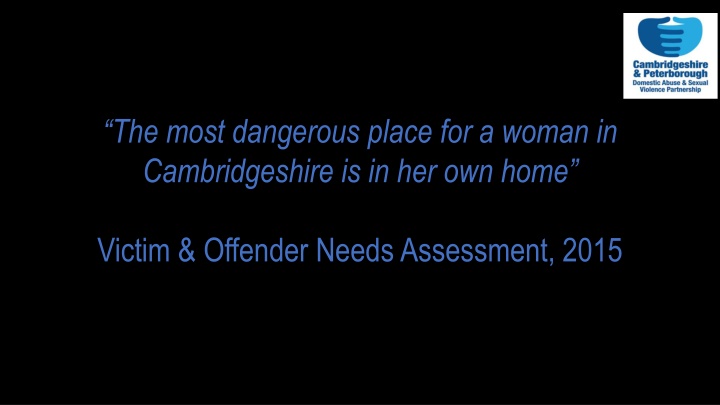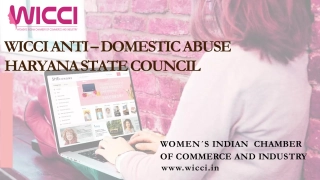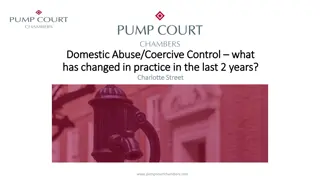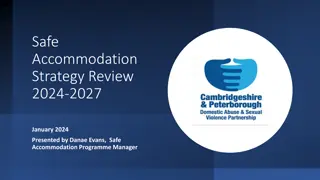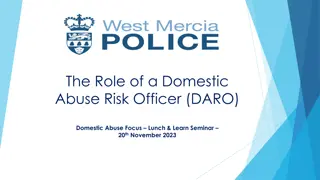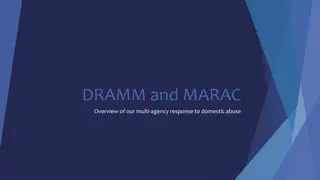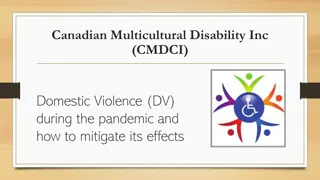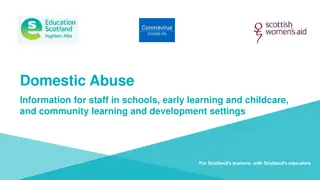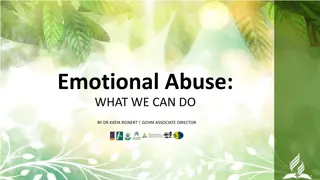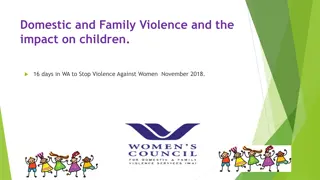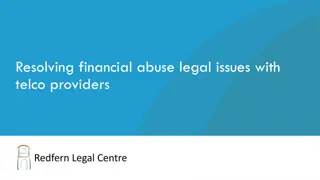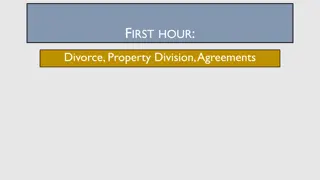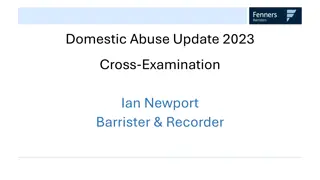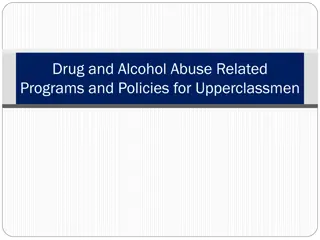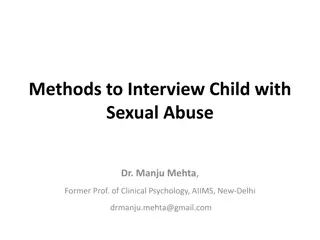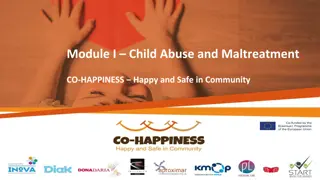Challenges in Domestic Abuse Support Systems
Key challenges in Cambridgeshire's domestic abuse support system include providing accessible accommodation, therapeutic support, and consistent aid in urban and rural areas. Efforts are being made to enhance refuge support, offer dispersed safe accommodation, and address barriers faced by survivors. Collaboration with local housing providers and agencies is being explored to meet the critical need for alternative safe accommodation.
Download Presentation

Please find below an Image/Link to download the presentation.
The content on the website is provided AS IS for your information and personal use only. It may not be sold, licensed, or shared on other websites without obtaining consent from the author.If you encounter any issues during the download, it is possible that the publisher has removed the file from their server.
You are allowed to download the files provided on this website for personal or commercial use, subject to the condition that they are used lawfully. All files are the property of their respective owners.
The content on the website is provided AS IS for your information and personal use only. It may not be sold, licensed, or shared on other websites without obtaining consent from the author.
E N D
Presentation Transcript
The most dangerous place for a woman in Cambridgeshire is in her own home Victim & Offender Needs Assessment, 2015
Safe Accommodation Strategy Update August 2022 Presented by Danae Evans, Safe Accommodation Programme Manager Cambridgeshire & Peterborough IDVA Service Data from report written by Megan McKenzie & Vickie Crompton
Identification of Local Needs Identified Key challenges for the Domestic Abuse system in our area were: Provision of easily accessible accommodation to those at risk of abuse and their children, but within the county area when it is safe to stay if survivors are provided with additional support . Provision of therapeutic support to survivors and their children who have experienced domestic abuse Ensuring greater support is provided to the housing sector to improve awareness and support to those experiencing domestic abuse Ensuring a consistency of support across both urban and very rural areas
1.Refuge Support In Cambridgeshire & Peterborough, Support costs are provided for four refuges, equating to space for 40 women and up to 72 children at any given time. Last year 102 adults used the refuges. Children s support workers are funded within each refuge and residents can also access talking therapies. In addition to this, refuges have access to Flexible Funding , to support those moving on from refuge. All refuges are expected to be as accessible as possible to those with additional support needs, in line with Refuge for All principles.
. 2.Dispersed Safe Accommodation: Dispersed safe accommodation will increase the options and choice for survivors across Cambridgeshire and Peterborough. This short-term move on accommodation is primarily for residents in this area who are experiencing domestic abuse. It will provide access to safe accommodation for: survivors and their children who are not able to live in a communal facility such as refuge or shared temporary accommodation. Or, who may have other barriers which prevent them form accessing alternative temporary accommodation . Dispersed safe accommodation could also be used short-term for clients fleeing Domestic Abuse who have No Recourse to Public Funds (NRPF) in conjunction with other agencies. The properties will be self-contained, have additional security, be furnished and will be available across the county, with the aim of a minimum of two properties per local authority area (12 in total across Cambs and Peterborough). Survivors will be referred by the IDVA service and have intensive support provided by the Housing IDVAs who will work with them to help them move back to their own homes with all safety measures in place where this is safe to do so, or support to move to alternative accommodation if required. The dispersed accommodation element was put out to competitive tender in May 2022, however, there were no suitable providers, therefore we are exploring partnership working with local housing providers and partner agencies, so that we can achieve this much needed alternative safe accommodation.
3. Housing IDVAs Across Cambridgeshire & Peterborough, a current team of four Housing IDVAs are able to offer a direct service to victims/survivors who attend a housing advice service. They also accept referrals from other housing providers in the area Currently two of the Housing IDVA team are partially co-located in local housing advice services. Due to the impact of Covid and new ways of working not all housing teams currently work from an office. But each Housing IDVA is linked to a particular housing team and area in the County. The Housing IDVAS support survivors, offering advice on safety planning and risk management as well supporting clients with their housing needs, and advocating on behalf of their client with housing and other professionals The Housing IDVAs can also offer case management support to housing teams/ and deliver awareness raising training and advice to staff based in these departments. The co-location of Housing IDVAS and Housing teams and housing providers having access to a specific IDVA referral pathway has already led to more collaborative work on behalf of survivors. Housing IDVAS can also offer support to those in temporary local authority accommodation who have suffered domestic abuse and this can be particularly valuable for survivors who have been housed in an unfamiliar area , needing to know about services and support that are available to them and their children Housing IDVAs worked with 103 Peterborough residents, and 178 Cambridgeshire residents between April 2021 and March 2022. We are continuing to see referrals increase from housing teams and other RSLs in the region.
A Housing IDVA Case Study Clare s Story: One of the Housing IDVAs worked with Clare, who had fled another area where she had been experiencing Domestic Abuse. The housing team had referred her to the service. Clare had experienced barriers and lack of confidentiality with statutory services; Family Courts, Children s Social Care & education and is required by law to take her children to school in another area, where the abusive partner lives. The Housing IDVA has advocated for her with Social Care, making a complaint on Clare s behalf when the impact of the domestic abuse on Clare and her children was minimised. The IDVA supported with their move from temporary to permanent accommodation and endeavoured to change the school arrangement. In a phone call with Clare, she said to the Housing IDVA: I never had an IDVA do as much for me. I can do anything with you by my side
4.Housing First The Domestic Abuse Housing First role focuses on those who have suffered domestic abuse, and who find it difficult to engage with standard support services due to multiple disadvantages and wherev there has been chronic exclusion. They are homeless, rough sleeping or sofa surfing in addresses which put them further at risk. The post holder is a trained IDVA and links closely with the Housing IDVA Team. This post has enabled intensive support of 5 women, their difficulties included: Poor mental health Alcohol Misuse Drug Misuse History of Rough Sleeping Learning difficulty Bereavement
5. Bobby Scheme/Target Hardening The Bobby Scheme works with domestic abuse specialists to enable households at risk of domestic abuse to remain in their own homes and reduce repeat victimisation through the provision of enhanced security measures. This is delivered in conjunction with working with a domestic abuse specialist and is available for all forms of tenure We have seen the numbers accessing the local Sanctuary/Bobby Scheme going up year on year. 495 in 2021/22, compared with 293 in 2019/20. 96% of clients reported increased feelings of safety and a greater ability to cope with everyday life
6. Flexible Funding Flexible funding supports victim/survivors to achieve or maintain safe and secure housing. It is low-barrier and does not require victim/survivors to provide evidence of abuse. It is not means tested but is available as part of an individual s domestic abuse support package. Unlike most other funding sources, there is no set list of what will be funded, and victims/survivors are able to access whatever will make the most difference to their housing situation and their lives, in order that the victim/survivor and their children can stay safe. Flexible funding will only be offered in conjunction with working with a domestic abuse specialist.
7. DAHA Accreditation The Domestic Abuse Housing Alliance s (DAHA) mission is to improve the housing sector s response to domestic abuse through the introduction and adoption of an established set of standards and an accreditation process. The aim is for all local authority housing teams and all large housing associations to be DAHA Accredited by March 2023. Obtaining accreditation not only enhances how housing providers interact with victim/survivors. It also strengthens the local area s coordinated community response to domestic abuse. Currently, across Cambridgeshire and Peterborough, Cambridge City Council, Cambridge Housing Society and Cross Keys Homes have gained accreditation (apologies if I have missed anyone) . All other district councils in the area are working towards DAHA accreditation , as well as the major housing associations.
7. Managed Reciprocals This is a mechanism whereby those suffering domestic abuse in a social tenancy can relocate to a different area within the County & Peterborough whilst maintaining their security of tenure. A managed reciprocal can offer survivors and those experiencing domestic abuse another housing option, particularly those who do not need an emergency move. The move to alternative accommodation is delivered in conjunction with other resources such as the Bobby Scheme and specialist domestic abuse support. Managed reciprocal requests are made by IDVAs and shared with local housing associations and housing teams. In 2021/22 there were 14 requests for the scheme, with three clients of the IDVA service being moved under the scheme. In April 22we reviewed how the manged reciprocals process is working and have made changes so that the it becomes more dynamic with monthly updates between the IDVA service & housing providers to ensure any reciprocal requests reflect the clients current need, which will enable providers to offer the most suitable accommodation.
Kelly is 18 and mum to a two-year-old. Kelly was keen to move due to her abusive ex- partners continued attempts to contact from prison and repeated breaches of conditions when released from prison on licence. She was initially offered a property in a Fenland town in September 2021 but unfortunately this was a third floor flat and unsuitable for her needs but she was very quickly offered a property elsewhere in October 2021. This property was in a very poor condition and not suitable for client. However, a third property was offered in December 2021, and this was accepted. There was a slight delay in moving due to her family contracting Covid-19 but she then moved into the property in March 2022. The communication from the housing association was very good throughout the process, with the IDVA and Kelly kept up to date. Kelly commented that it was helpful to be able to select areas that she was happy to move to and she was very pleased with how quick the process was
8. Therapeutic Support for adults experiencing domestic abuse To provide specialist trauma informed counselling and therapeutic support for adults who are victims of domestic abuse. In Peterborough, 65 adults received counselling whilst 55 did in Cambridgeshire. I'm not really sure if I can find the words to say how grateful I am for being given the recent counselling. It has changed my life immeasurably and got me through some really difficult things and thoughts. I have no idea how I would have got through it without the support I have received.
9. Therapeutic support for children experiencing domestic abuse It is vital to provide specialist trauma informed counselling and therapeutic support for children who are victims of domestic abuse. Through Embrace, a charity dedicated to supporting children and young people who are victims of crime, 99 children and young people in Cambridgeshire and a further 43 in Peterborough have been supported through counselling.
10. Mobile advocacy outreach support This is a direct service to victims/survivors, at location of their choosing including a range of community settings where the service can expand their access. The Mobile Advocacy outreach service across the region is currently delivered by Refuge and Womans Aid. Support is offered to victims/survivors to secure stable housing, which includes exploring and pursing options for remaining in an existing property and relocating if needed for safety reasons. The specialist workers would have access to all elements within this strategy such as flexible funding, managed reciprocals and therapeutic support. Supporting those who have been subjected to domestic abuse and are still living in their own homes, will continue to be funded with the Safe Accommodation Funding - this is currently out for competitive tender in accordance with procurement legislation
11.Victims with no recourse to public funds The Housing IDVAs and Mobile Advocacy Support Workers will work with clients with No Recourse to Public Funds (NRPF) to access the Domestic Violence Destitution Concession from the government where possible. Where a client is not eligible for this, they would still be eligible for all the options outlined within the strategy, with the exception of local refuge accommodation (if refuge is required, a placement would be sought elsewhere). Although one family were funded to stay in a refuge due to exceptional circumstances. As we know survivors with NRPF face additional barriers in finding safe accommodation. So the work that the Houing IDVAs, IDVAs and Mobile advocacy service in supporting these clients access funding is vital.
Going Forward: We are Working with local private landlords and local Private Rented Sector teams in the Local Authorities to increase the awareness of domestic abuse and how this affects their tenants. Also raising awareness of how private landlords can assist where there is domestic abuse. This strand of work will be a priority in 2022/23 and we are looking to deliver training and awareness through Landlords forums, newsletters and other forums where the local authorities link up with their local private landlords. Sheltered Accommodation/Supported Accommodation/Hostels All newly commissioned providers must have a domestic abuse policy for staff and residents. Ideally working towards or having DAHA Accreditation, or Make a Stand accreditation from the Chartered Institute of Housing.
Funding The Department of Levelling Up, Housing and Communities (DHLUC) have confirmed funding for the Strategies into 2023/24. In future years this funding will be incorporated into the overall grant from government to the Tier One local authorities Across Cambridgeshire and Peterborough; There were almost 3,000 individuals who have received support via this funding stream in 21/22; 102 women in the local refuges, 1,900 supported by DA outreach services and the housing IDVAs, 120 adults received counselling, 250 children received therapeutic interventions. 495 homes were better secured by the Bobby scheme.
This strategy has been overseen by the Domestic Abuse Partnership Board and VAWG Operations Group, in conjunction with the Tier 2 Local Authorities as part of the SubRegional Housing Meeting . Thank you all for listening. Are there any Questions? Danae.evans@Cambridgeshire/gov.uk www.cambsdasv.org.uk
